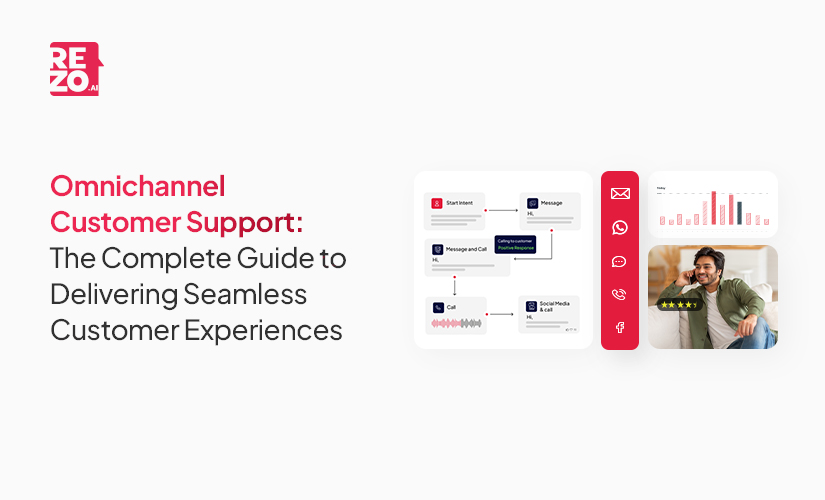
Call Center CRM Software: The Complete Guide to Finding Your Ideal CRM Solution

Call Center CRM Software: The Complete Guide to Finding Your Ideal CRM Solution


Great customer experience starts with having the right tools to get the job done. For call centers, that tool is CRM Software's, a practical solution that helps businesses stay organized, manage customer interactions efficiently, and maintain strong customer relationships.
Companies using a CRM are 86% more likely to achieve their sales targets, with many reporting a 21-30% revenue boost after implementation in 2024.
Freshworks
In this blog, we’ll break down:
- What is Call Center CRM Software
- Why it is important
- How CRM Works for Contact Center vs Call Center
- How to choose the right CRM for your business in 2025
What is Call Center CRM Software?
Call Center Customer Relationship Management software is a tool that helps businesses keep track of all their customer interactions, making it easier for agents to provide fast, personalized service.
It stores important customer information, like contact details, purchase history, and previous conversations, so agents can quickly access everything they need to know about a customer.
This helps agents understand the customer's needs and respond more effectively.

In past few years, call centers have realized the true potential of utilizing CRM software to enhance their customer service.
In fact, CRM software has become an essential tool for businesses across industries, with 73% of companies adopting it in 2024.
The benefits of CRM systems are undeniable, especially as tech companies lead the way with 94% using CRM tools to improve sales efficiency and strengthen customer relationships. But it’s not just the tech sector. Industries like Manufacturing (86%), Education (85%), Healthcare (82%), and Human Resources (81%) are also leveraging CRM software to streamline operations.

Importance of CRM for Businesses
Organizations can leverage CRM systems to enhance customer experiences and build stronger relationships. Here are 7 key CRM uses that benefit any business:
1. Understand Your Customers Better
CRM helps gather and analyze customer data, like preferences and purchase history, enabling personalized interactions. This deeper understanding improves customer satisfaction, loyalty, and creates opportunities for upselling and cross-selling, driving revenue growth.
2. Streamline Sales and Marketing Processes
CRM automates tasks like lead generation and follow-up, saving time and ensuring no leads are missed. With data-driven insights, businesses can optimize marketing strategies for better results, increasing efficiency and productivity.
3. Improve Customer Service and Support
A CRM centralizes customer information, allowing support teams to offer personalized and timely assistance. Automated processes like ticketing enhance service efficiency, leading to higher customer satisfaction and loyalty.
4. Increase Efficiency and Productivity
CRM systems automate repetitive tasks like data entry and lead management, reducing manual work and errors. This increases productivity by enabling businesses to focus on high-priority tasks and make data-driven decisions.
Also Read: How Agents Can Focus On Customers Rather Than Notes
5. Foster Collaboration and Communication
With a CRM, teams can easily share customer insights and collaborate across departments. Real-time updates ensure everyone is aligned and working towards common goals, improving coordination and efficiency.
6. Increase Customer Retention and Loyalty
By tracking customer interactions and preferences, CRM helps businesses personalize marketing efforts and anticipate needs. This strengthens customer relationships, boosting retention and loyalty.
7. Drive Business Growth and Expansion
CRM allows businesses to understand customer needs and proactively engage with relevant offers. Focusing on customer retention drives repeat business, ultimately contributing to growth and expansion.
Read Now: CRM in Banking Sector

Contact Center vs Call Center: How CRM Software Works for Both
The terms call center and contact center are often used interchangeably, but they represent two different approaches to customer service. As businesses look to optimize their customer support strategies, understanding the key differences between these two types of centers and how CRM software can support both is crucial.
Let’s have a look:
How to Choose the Best CRM for Call Center in 2025
The right call center CRM systems can transform how your business operates, but selecting one requires a focus on critical factors. Let’s break down the most essential aspects to ensure your CRM investment pays off:

1. Scalability
Why It Matters: Your business might be small today, but as you grow, your CRM system should grow with you. A scalable CRM system ensures you won't outgrow the platform as your customer base, data volume, or team expands.
What to Look For:
- Ability to handle more users and increased data storage.
- Advanced features that can be unlocked as you scale (like analytics or AI-driven insights).
- Cloud-based CRMs are particularly scalable, allowing seamless upgrades.
2. Artificial Intelligence and Automation
Why It Matters: AI and automation can drastically reduce manual work, improve accuracy, and streamline processes like lead qualification, follow-ups, and customer segmentation.
What to Look For:
- AI Features: Predictive analytics, Voice Automation, sentiment analysis, and intelligent call routing.
- Automation: Workflow automation for repetitive tasks like data entry, scheduling, or triggering follow-ups based on customer behavior.
- Chatbots, Voicebots and Virtual Assistants for 24/7 customer support.
3. Ease of Use
Why It Matters: A CRM’s effectiveness depends on your team’s ability to use it. Complex tools can slow adoption, frustrate users, and reduce efficiency.
What to Look For:
- Intuitive interface with minimal learning curves.
- Role-based dashboards so team members can easily access relevant features.
- Training resources or a customer success team to help your team get started.
4. Integrations
Why It Matters: A CRM isn’t just a standalone tool—it should fit seamlessly into your existing tech stack to centralize your workflows.
What to Look For:
- Compatibility with tools like email platforms, project management software, and social media tools.
- Integration with marketing automation, analytics platforms, and ERPs.
- Open APIs for custom integrations.
5. Cost
Why It Matters: While you want the best features, they need to align with your budget to ensure long-term affordability.
What to Look For:
- Transparent pricing models: Understand what’s included in each tier.
- Free trials or freemium options to test the CRM before committing.
- Consider the ROI: A slightly higher cost CRM might save time and resources in the long run.
The Future of Call Center CRM Systems in 2025
As technology advances, call center CRM systems are evolving to make customer interactions smoother, faster, and more personalized. Here’s what you can see in 2025:
- AI-Powered Automation: CRM and call center operations will become more efficient with AI Integration like Rezo.ai handling routine tasks like FAQs and ticketing, allowing agents to focus on complex issues.
- Voice AI for Better Conversations: Call center CRM software will use Voice AI to analyze tone and intent, making customer interactions more human-like and responsive.
- Smarter Call Routing: AI-driven CRM contact center solutions will connect customers to the right agent instantly, reducing wait times and improving first-contact resolution.
- Seamless Integrations: Future call center CRM platforms will work effortlessly with business tools like marketing automation, analytics, and customer service software, creating a Omnichannel customer experience.
- Proactive Customer Engagement: Businesses will shift from reactive service to proactive outreach, using AI-powered insights to anticipate customer needs before they arise.
In 2025, CRM and call center solutions will go beyond just managing customer data, they will actively drive better engagement, faster resolutions, and stronger relationships
Top CRM Software to Consider in 2025
Now that you know what to look for in a CRM, here are some of the top CRM software options to explore in 2025:
1. Salesforce
Known for its scalability and robust AI-powered features, Salesforce offers extensive integrations and customization options. Ideal for businesses of all sizes and industries.
2. HubSpot CRM
A great option for small to medium businesses, HubSpot offers a free plan with essential features and easy scalability as your business grows.
3. Zoho CRM
Zoho CRM provides an affordable solution for small and growing businesses, with excellent AI and automation capabilities.
4. Microsoft Dynamics 365
Perfect for larger enterprises, Microsoft Dynamics integrates seamlessly with other Microsoft tools like Office 365 and Teams.
5. Freshworks CRM
A cost-effective option for small and medium businesses, Freshworks CRM offers solid AI and automation features with an intuitive interface.
Transform Your CX with AI-Powered Contact Center Solutions | Rezo.ai
Choosing the right call center CRM software is just the first step. To truly maximize efficiency, businesses need automation that reduces agent workload and enhances customer interactions. That’s where Rezo.ai comes in.
Rezo.ai is a data-first contact center powered by autonomous agents that boost revenue and transform customer experience. Using advanced AI and NLU, it automates and analyzes interactions at scale across voice and non-voice channels in 20+ languages, while also training and coaching agents at minimal cost.
Power Your CRM with Rezo.ai's Intelligent Solutions
- Engage AI: Automates customer interactions across multiple channels with Smart Contact Strategy, Dynamic Scripts, and Multi-lingual Bots, ensuring seamless communication and brand consistency.
- Analyze AI: Extracts insights from every conversation with Speech-to-Text (STT), automated tagging, and SOP audits, ensuring compliance and improving agent performance.
- Agent Assist: Provides real-time guidance, reducing handling time and increasing first-call resolution rates while also identifying upsell and cross-sell opportunities to boost revenue.
- Seamless CRM Integration: Works effortlessly with Salesforce, HubSpot, Zoho, Microsoft Dynamics 365, Freshworks, and other CRM and call center platforms, creating a unified and intelligent workflow.
The Future of CRM and AI-Powered Contact Centers
A CRM system isn’t just about managing customer data—it’s about understanding your customers on a deeper level. By analyzing details like preferences, purchase history, and communication habits, you can deliver personalized experiences that improve satisfaction, loyalty, and drive sales. This also creates opportunities for upselling and cross-selling, boosting revenue potential.
Rezo.ai takes this further by integrating AI to automate tasks, analyze customer interactions, and provide agents with real-time insights, allowing them to focus on high-value conversations. With Rezo.ai, you’re not just meeting customer needs; you’re anticipating them, driving growth, and improving efficiency.
Transform your contact center with Rezo.ai
FAQs on Call Center CRM Software
1. What is Contact Centre CRM Software? Why it is Important?
Contact Centre CRM software is a tool that helps businesses manage and track customer interactions across multiple channels like voice, email, chat, and social media. It provides agents with quick access to customer information, enabling personalized service, faster responses, and better customer experiences.
2. What are the key features of Call Center CRM Software?
Call Center CRM software offers key features like centralized customer data, automated task management, real-time agent assistance, omnichannel support, analytics & reporting, and seamless integrations. These features boost agent productivity, improve customer satisfaction, and provide valuable business insights.
3. What are the pros and cons of CRM?
The key benefits of CRM include Improved customer relationships, streamlined sales and marketing processes, enhanced customer service, data-driven decision-making, and increased customer retention. However, they require high implementation and maintenance costs, potential complexity, data privacy concerns, resistance from employees to adopt new technology, and the risk of over-reliance on technology over personal interactions.
Frequently Asked Questions (FAQs)

Take the leap towards innovation with Rezo.ai
Get started now















